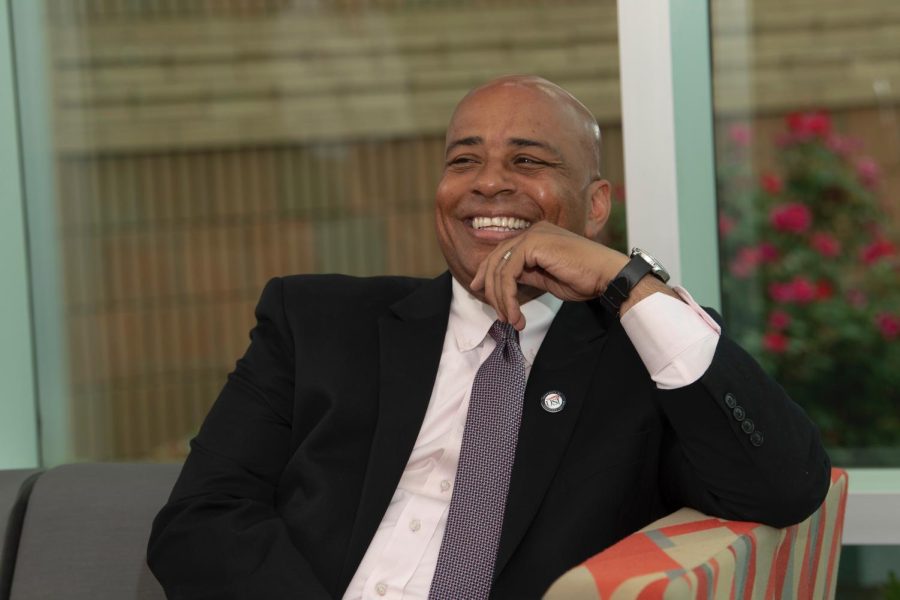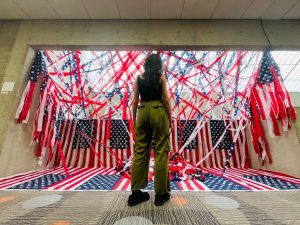Q&A with the first Black president of USI
Photo courtesy of USI Photography and Multimedia
Ronald Rochon became the president of USI in 2019.
February 17, 2022
February is Black History Month. Black History Month celebrates the accomplishments of Black Americans. President Ronald Rochon is making history as the first Black president of USI. Rochon was inaugurated as the fourth president of USI on April 5, 2019.
Q: What does it mean to you to be the first Black president at USI?
A: “The thing it means most I really believe, at this stage, is an understanding of the number of women and men who look like me who came before me. They weren’t given a chance, and I don’t mean that necessarily at USI, I mean, given a chance within our nation, just because of the color of their skin. I am a proud man of African descent. I am a proud man who takes his ancestors seriously, who was humbled by the history of my ancestral struggle. Who was humbled by the resiliency, the strength, the courage, the brilliance of my ancestors. And also who was encouraged by their dreams, their hopes and their aspirations that one day a person like me could actually lead an institution like USI. Growing up, I lived in a predominantly Black community. White people left our community when my mother and father bought a home. I still think today, unfortunately, we still find ourselves in many ways segregated with our behavior. I’m hopeful that you seeing me gives you some kind of aspirational hope to build relationships across race, class, gender – all these defining lines that keep us from really understanding who the other is. My hope, dream, and aspirational goal as a president is to make sure that all the students who I represent understand that I serve you all, with great pride and dignity. But my goal is that we all try to find a way in which we seek out the other, whoever the other is, and build relationships with the other and make this world a better place. ”
Q: Do you think your experience as a Black man in this field has made you face any adversity or unique challenges? If so, how do you overcome such challenges?
A: “I have faced adversity without question like everybody else faces adversity, and sometimes the adversity I face is due to race. What I’ll tell you though is that I’m able to face adversity through the students. When I look at the students, it gives me strength. It gives me optimism. It gives me calm. It gives me patience and also gives me joy. You all bring that to me. Even when I don’t even know your names. When I’m dealing with something that upsets me or that I believe is unfair or just really unfortunate, you’ll be surprised how often I walk out of the office or walk across campus, and all of a sudden I see this amazing optic of students doing something so productive and so healthy that will have an impact on the life of someone else. It helps you to understand that many of the trials that we deal with are temporary and as large as they may seem, and I’m not saying that they’re not large sometimes, we need to continue to find ways to push forward; to build collaboration and find ways in which we can build relationships with folks who have other answers, new answers, new ways of thinking, and engaging and reconciling. I’m like you all and have trials and tribulations as well. And I find really amazing solace in responding to the presence of students at USI without question.”
Q: What advice would you give to students who feel underrepresented in their field?
A: “I know how that feels. I’ve experienced that quite a bit through my years of development and also even my years as a professional. I think finding ways in which you can build allied relationships with individuals is an important piece. I think sometimes by being maybe the only African American in the room, which happens a lot to me, I present this opportunity to help individuals to understand that this equation is incomplete. Know that we need to work harder to bring additional differences in the room and find ways in which we can do that in a way in which no one is feeling threatened. I would encourage everybody to look at the room. Look at your classrooms, policy rooms, board rooms, and see who’s missing. That’s my goal as president of this university – to make sure that we are running towards even more diversity, more enhanced diversity opportunities, to support all of our students, all of our faculty, all of our staff, and all of our external community members. Making sure that USI is not only promoting their message but we’re living the message.”
Q: What is your academic and personal history? What steps did you take to get where you are now?
A: “I had to climb several mountains, I had to climb Mount Everest. You know, I went to school, of course, went to undergraduate school, and went to get a master’s degree and get a PhD at the University of Illinois. During the time period of my schooling, I met amazing professors and staff members who really helped prepare me for this opportunity, understand what it was going to take and what I needed to do to advance my own ability with my skill sets, and my thinking, and my engagement and interaction with people and institutions…But the other part of it also is just other aspects of training or going to leadership seminars, being involved with case studies with our colleagues across the country. Paying close attention to the trends of higher education, what’s going on both nationally and internationally. It doesn’t stop, I’d say. You continue to come to work each day and there are new challenges before you each day or each week and you try your best to apply your skills with your colleagues, people that are around you, that are highly skilled, highly competent, highly qualified and highly motivated to serve other people. And that’s really you know, the kind of the driving force for the job for me. At least I just really believe that it’s not predictable when you’re working to serve people. Things come before you that you’d never, ever anticipated. I wasn’t president very long before this pandemic occurred. There was no playbook, no templates, no examples of how to manage it, how to work through it. I’ve been really dependent upon a day by day response, a week-by-week response, and a month-by-month response with my colleagues, the faculty, the staff ,and the student body. We’ve been able to do this, lead through this, together. And I think that for me at least, the presidency is all about working together with the community to serve the community.”
Q: What motivates you to keep doing what you’re doing?
A: “You know, it’s the easiest question for me. Students. I am so wedded to student success. The university is open because students have decided to come here. The university’s mission is all about advancing the ability of students. The university thrives because you have an amazing student body there to engage, to serve, to teach and also to learn from.”
Q: How do you think diversity on campus has changed over the years? What hopes do you have for its future?
A: “We have definitely been very intentional with our efforts of diversity of all kinds at USI. From people who are differently abled, to the obvious construct of race and ethnicity, to gender identity. I mean, the list goes on, and I’m just really happy that we are getting into a space where people are becoming more comfortable, becoming more respectful. We’re respectful of what diversity means to us as a community, what it means to us as a nation. I am hopeful that we will continue to run, not walk, toward greater diversity opportunities for all people. Part of the goal should always be, for me, safety. No matter who you are, at a university you should be physically safe, emotionally safe, socially safe, culturally safe, intellectually safe. No matter who you are, you should be celebrating if you have the opportunity to, to know that you are not going to be outed or harmed or left out because of who you are. That’s my goal as president of this university, to make sure that we are running towards even more diversity, more enhanced diversity opportunities, to support all of our students, all of our faculty, all of our staff, and all of our external community members. Making sure that USI is not only promoting their message, but living their message.”
Q: What does President Rochon want his students to know?
A: “Let the students know that I am humbled and honored to serve as their president, let the students know that I love them as human beings. I really want what I’m speaking about to happen. I want students to know that this is hard work, that this won’t occur just because we’re saying we want it. We have to work. This is complex, deep, hard work. It’s the hardest work that we will ever do in our lives because it involves human beings. It involves human history, human emotion. It involves us watching television that has images where we see divisiveness, we see this on a daily basis and how do we reconcile this? How do we build trust with one another? I really want us to work toward this goal, and I want students to know this. This is hard, worthy work. I really believe that with all my heart. And let me just close by saying that I believe the work is so worthy because we are responsible for the well being of children. The question is, what do you want for the children within schools today? What do we want for kids who are learning their colors right now, who are developing new likenesses and interests and developing more and more curiosity? What do we do with regard to making sure they have healthy information about both themselves and about other people, about neighbors, about people next door, people across the tracks? People across a border? What do we want to teach children? And how do we want to impart within them the opportunity to develop the relationships we’ve been talking about?”








